Related Research Articles

The film industry in Germany can be traced back to the late 19th century. German cinema made major technical and artistic contributions to early film, broadcasting and television technology. Babelsberg became a household synonym for the early 20th century film industry in Europe, similar to Hollywood later.

Friedrich Christian Anton Lang, better known as Fritz Lang, was an Austrian film director, screenwriter, and producer who worked in Germany and later the United States. One of the best-known émigrés from Germany's school of Expressionism, he was dubbed the "Master of Darkness" by the British Film Institute. He has been cited as one of the most influential filmmakers of all time.

The Great Dictator is a 1940 American anti-war political satire black comedy film written, directed, produced, scored by, and starring British comedian Charlie Chaplin, following the tradition of many of his other films. Having been the only Hollywood filmmaker to continue to make silent films well into the period of sound films, Chaplin made this his first true sound film.

Henri-Georges Clouzot was a French film director, screenwriter and producer. He is best remembered for his work in the thriller film genre, having directed The Wages of Fear (1953) and Les Diaboliques (1955), which are critically recognized as among the greatest films of the 1950s. He also directed documentary films, including The Mystery of Picasso (1956), which was declared a national treasure by the government of France.
UFA GmbH, shortened to UFA, is a film and television production company that unites all production activities of the media conglomerate Bertelsmann in Germany. Its name derives from Universum-Film Aktiengesellschaft, a major German film company headquartered in Babelsberg, producing and distributing motion pictures from 1917 until the end of the Nazi era. The name UFA was revived by Bertelsmann for an otherwise unrelated film and television outfit, UFA GmbH.

German Expressionism consisted of several related creative movements in Germany before the First World War that reached a peak in Berlin during the 1920s. These developments were part of a larger Expressionist movement in north and central European culture in fields such as architecture, dance, painting, sculpture and cinema. This article deals primarily with developments in German Expressionist cinema before and immediately after World War I, approximately from 1910 to the 1930s.

Danielle Yvonne Marie Antoinette Darrieux was a French actress of stage, television and film, as well as a singer and dancer.
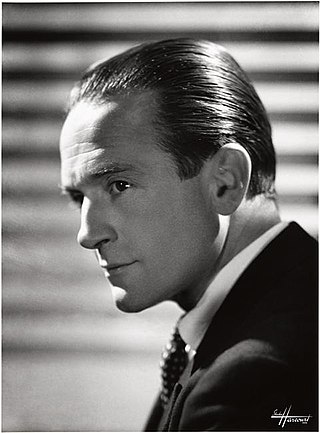
Pierre Fresnay was a French stage and film actor.
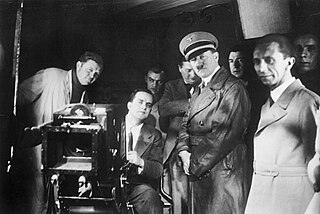
Nazism created an elaborate system of propaganda, which made use of the new technologies of the 20th century, including cinema. Nazism courted the masses by the means of slogans that were aimed directly at the instincts and emotions of the people. The Nazis valued film as a propaganda instrument of enormous power. The interest that Adolf Hitler and his propaganda minister Joseph Goebbels took in film was not only the result of a personal fascination. The use of film for propaganda had been planned by the Nazi Party as early as 1930, when the party first established a film department. The goals of the department included using the economic power of German moviegoers to self-censor films globally, resulting in all but one Hollywood producers censoring films critical of Nazism and even showing news shorts of film produced by the Nazis in American theaters. No American films between 1933-1939 were critical of Nazism.

Quai des Orfèvres is a 1947 French police procedural drama film based on the book Légitime défense by Stanislas-Andre Steeman. Directed by Henri-Georges Clouzot the film stars Suzy Delair as Jenny Lamour, Bernard Blier as Maurice Martineau, Louis Jouvet as Inspector Antoine and Simone Renant as Dora.
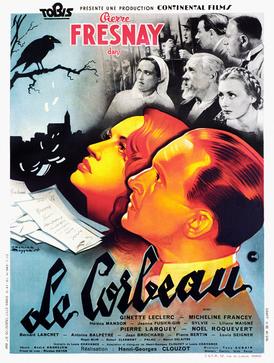
Le Corbeau is a 1943 French film directed by Henri-Georges Clouzot and starring Pierre Fresnay, Micheline Francey and Pierre Larquey. The film is about a French town where a number of citizens receive anonymous letters containing libelous information, particularly targeting a doctor accused of providing abortion services. The mystery surrounding the letters eventually escalates into violence.

Joe May was an Austrian film director and film producer and one of the pioneers of German cinema.
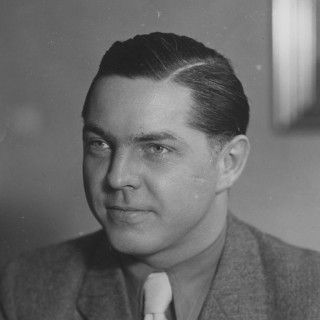
Fritz Hippler was a German filmmaker who ran the film department in the Propaganda Ministry of Nazi Germany, under Joseph Goebbels. He is best known as the director of the propaganda film Der Ewige Jude .
André Andrejew was one of the most important art directors of the international cinema of the twentieth century. He had a distinctive, innovative style. His décors were both expressive and realistic. French writer Lucie Derain described Andrejew at the peak of his career as "an artist of the grand style, blessed with a vision of lyrical quality." Edith C. Lee wrote recently: "Believing in creative freedom rather than academic reconstruction, André Andrejew fulfilled the 20th century's notion of the romantic, individualistic artist. The unusual titillated his imagination."

Erich Pommer was a German-born film producer and executive. Pommer was perhaps the most powerful person in the German and European film industries in the 1920s and early 1930s.
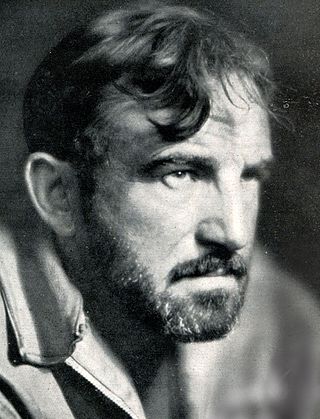
Charles-Marie Vanel was a French actor and director. During his 76-year film career, which began in 1912, he appeared in more than 200 films and worked with many prominent directors, including Alfred Hitchcock, Luis Buñuel, Jacques Feyder, and Henri-Georges Clouzot. He is perhaps best remembered for his role as a desperate truck driver in Clouzot's The Wages of Fear for which he received a Special Mention at the Cannes Film Festival in 1953.
La Symphonie fantastique is a 1942 French drama film by Christian-Jaque and produced by the German-controlled French film production company Continental Films. The film is based upon the life of the French composer Hector Berlioz. The title is taken from the five-movement programmatic Symphonie fantastique of 1830. The film lasts around 90 minutes and was first shown at the 'Normandie' cinema in Paris on 1 April 1942. The posters at the premiere contained the sub-title 'La Vie passionnée et glorieuse d'un génie'.
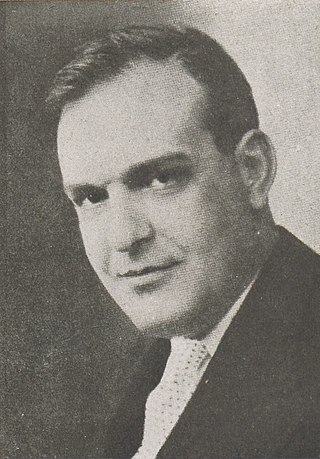
Charles Spaak was a Belgian screenwriter who was noted particularly for his work in the French cinema during the 1930s. He was the son of the dramatist and poet Paul Spaak, the brother of the politician Paul-Henri Spaak, and the father of the actresses Catherine Spaak and Agnès Spaak.
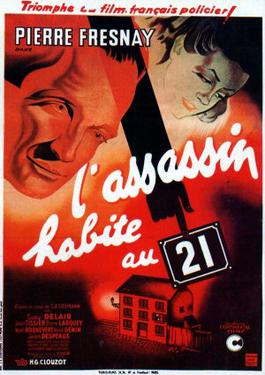
The Murderer Lives at Number 21 is a 1942 French comedy thriller film by director Henri-Georges Clouzot. Adapted by Belgian writer Stanislas-André Steeman and Clouzot from Steeman's 1939 book of the same title, it was Clouzot's debut feature film as a director. The film is about the hunt by detective Wens for the murderer Monsieur Durand, who leaves calling cards and manages to be everywhere at once. With the aspiring actress Mila Malou, Wens follows clues to a seedy boarding house where he hopes to find the murderer.

Tobis Film was a German film production and film distribution company. Founded in the late 1920s as a merger of several companies involved in the switch from silent to sound films, the organisation emerged as a leading German sound studio. Tobis used the Tri-Ergon sound-on-film system under the Tobis-Klang trade name. The UFA production company had separate rights to the Tobis system, which it used under the trade name of Ufa-Klang. Some Tobis films were released in Germany by the subsidiary Europa Film.